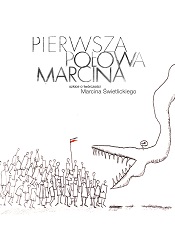

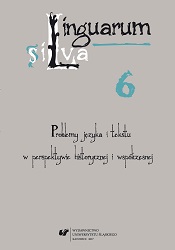
The essay represents a part of the research in the functional efficiency of the Polish language of the past centuries and it constitutes a contribution to the history of the teaching of the English language in Poland perceived in the historical-linguistic perspective. It is devoted to textbooks intended for learners of English published in Polish in the years 1788–1914. The object of analysis is constituted by the titles and the prefaces to the textbooks which were published in that period. The analysis enabled the indication of the typological variety ofthe textbooks, the recipient of the textbooks who is implied by their authors, the content of the textbooks and the attitude of the author to the content which is presented. The article indicates that the early English-language textbooks constitute a varied collection of non-literary texts whose research enables the supplementation of knowledge about the type of a text which is represented by textbooks for the study of foreign languages by a diachronic perspective.
More...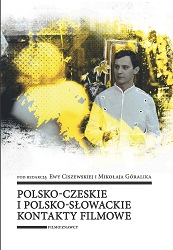
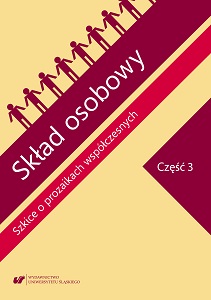
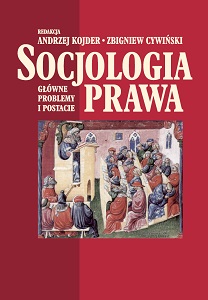
Keywords: sociology of law; law in social life; legal sociology authors; world sociological and legal writings
The first world encyclopaedic guidebook to the most important problems of the sociology of law. It contains nearly one hundred and fifty entries written by eminent Polish and foreign scholars. It is an excellent source of knowledge of the role and importance of law in social life. It sketches portraits of the most distinguished authors of legal sociology and presents their scientific achievements. It also discusses law subcultures, punitive justice, anthropology and atrophy of law, the destruction of norms, the iuridisation of social life, law nihilism, praxeology and feminist sociology of law.
More...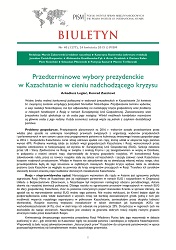
Keywords: Kazakhstan; early presidential elections; president Nursultan Nazarbayev; successor of the president; president’s family members as possible successors;
Wobec braku realnej konkurencji politycznej w wyborach prezydenckich w Kazachstanie 26 kwietnia br. zwycięzcą zostanie urzędujący prezydent Nursułtan Nazarbajew. Przyśpieszenie terminu wyborów, a więc reelekcji Nazarbajewa, ma być odpowiedzią na narastający kryzys gospodarczy oraz problemy w relacjach handlowych z Rosją w ramach Eurazjatyckiej Unii Gospodarczej. Zaawansowany wiek prezydenta budzi spekulacje co do osoby jego następcy. Wśród możliwych kandydatur rozważane są głównie osoby z jego rodziny. Każdy scenariusz sukcesji wiąże się jednak z ryzykiem destabilizacji państwa.
More...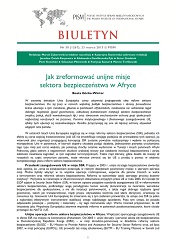
Keywords: European Union; security sector reform; army; police; intelligence services; preventing violence and terrorism;
W ostatniej dekadzie Unia Europejska coraz aktywniej propagowała ideę reform sektora bezpieczeństwa. Do tej pory w ramach wspólnej polityki bezpieczeństwa i obrony prowadzono liczne operacje o tym mandacie, głównie w państwach afrykańskich, nastawione na: wdrażanie reguł dobrego rządzenia (good governance), odbudowę państwowych instytucji sektora bezpieczeństwa (wojska, policji, służb wywiadowczych itp.) oraz stworzenie mechanizmów ochrony grup społecznych najbardziej narażonych na przemoc. Pomimo instytucjonalnego i finansowego zaangażowania UE, efekty tych operacji są niezadowalające. Rzadko przyczyniają się one do lepszej ochrony obywateli objętych nimi państw.
More...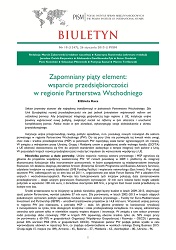
Keywords: Eastern Partnership region; economic integration of the eastern partners with the Union; business environment reforms; economic policy; transformation process; support of entrepreneurship; private sector;
Sektor prywatny stanowi siłę napędową transformacji w państwach Partnerstwa Wschodniego. Dla Unii Europejskiej rozwój przedsiębiorczości nie jest jednak priorytetem wspieranych reform ani udzielanej pomocy. Aby przyspieszyć integrację gospodarczą tego regionu z UE, instytucje unijne powinny wypracować nową politykę, zwiększyć nacisk na reformy w tym obszarze i uruchomić kompleksową pomoc. Polska może w tym doradzać, wykorzystując swoje doświadczenia z okresu przedakcesyjnego.
More...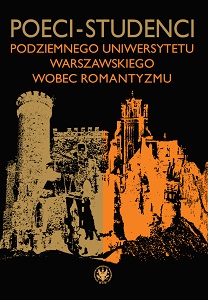
Keywords: underground University of Warsaw; poetry; students; occupation literature; Warsaw Uprising; World War II
The book is a successful attempt to renew research on the literature of war and occupation conducted so far, and at the same time to present the phenomenon of the underground University of Warsaw and its educational, academic, and cultural activity in particular with regard to literary studies. The authors describe the profiles of young artists for whom the ideas of Romanticism were a constant point of reference in their writing and in the armed combat against the occupier.
More...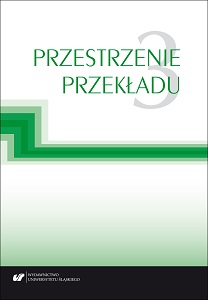
Keywords: scientific text; philosophical text; French philosophers; idiolect;translation;
This paper centres on the author’s considerations concerning a selection of her translations of philosophical books from French into Polish, including Plotinus or the Simplicity of Vision by Pierre Hadot (2004), Intellectual Autobiography by Paul Ricoeur (2005), Philosophizing ad Infinitum by Marcel Conche (2007) and Speech and Action in Heraclitus. On the Theoretical Foundations of Moral Action by Michel Fattal (2013). In the paper, the author discusses the specific nature of translation of a philosophical text constituting an example of a scientific (non-literary) text. She defines the notion of idiolect and analyses a number of elements of the idiostyle of the philosophers listed above. These elements include: the work titles, the beginning and the end of the text, the style, including primarily the (non-)emotionality and metaphorisation as well as the meta-language and selected terminological aspects. As a preliminary point of the paper, the author presents a hypothesis, trying to substantiate it in her analysis, that a scientific text, including a philosophical one, is distinguished by an individual style of its author, whereas non-emotionality, impersonality and non-subjectivity are only the postulated features of a scientific text.
More...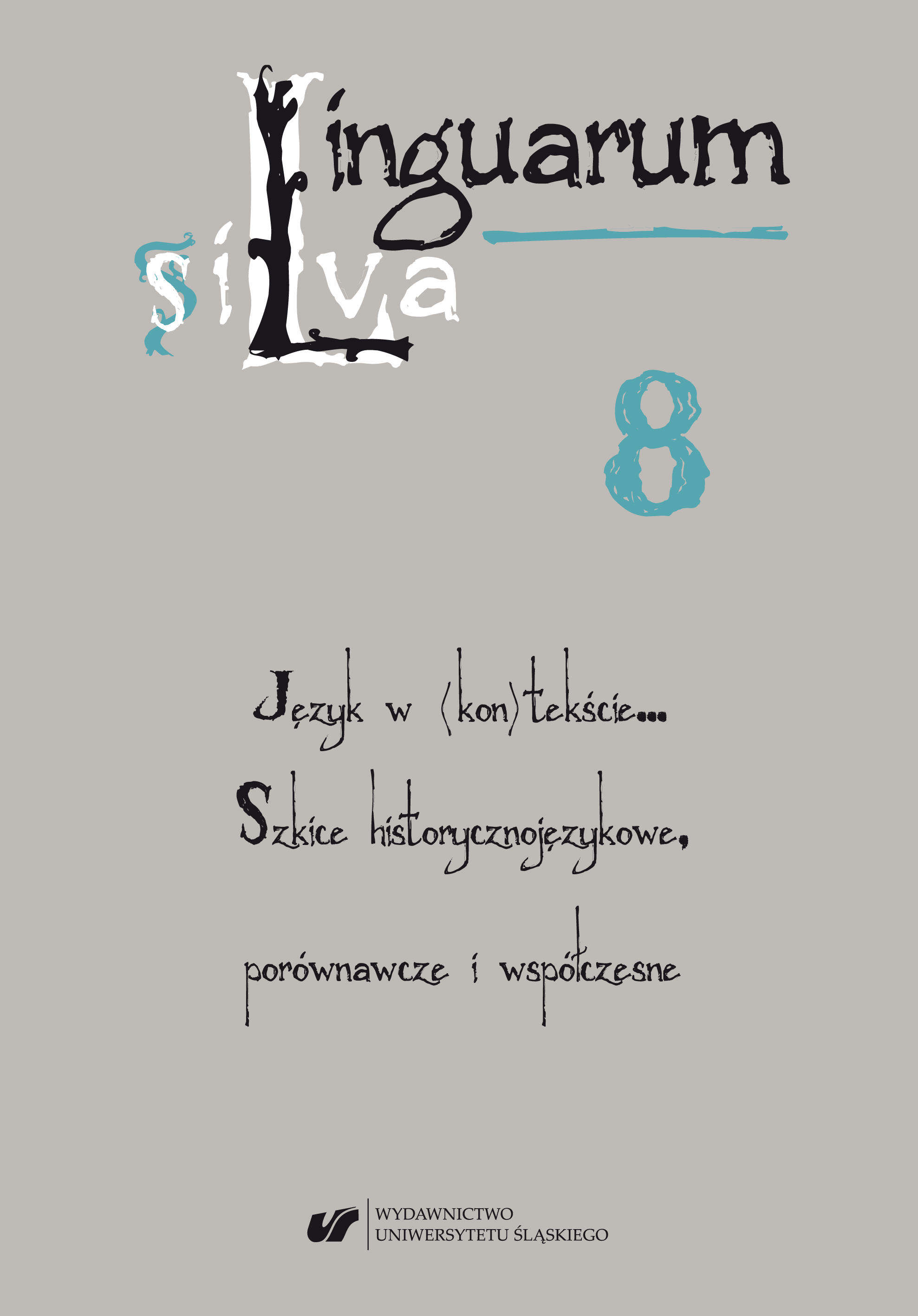
The following article has been written on the basis of historical, sociolinguistic and etymological study concerning the interaction of the Slavic languages: Polish and Ukrainian. The importance of this article consists in its pioneering study of paronyms and homonyms in Ukrainian and Polish, focusing on the etymological aspect, on the basis of a comparative approach to homonymic lexical units, which, in turn, reveals the importance of ‘false friends’ in the contemporary social life. The aim of this study, then, is to showcase selected homonymic and paronymic lexical units in the etymological aspect.
More...
The article focuses on identifying the differences between the two Czech verb prefixes pro‑ and pře‑, whose Polish equivalent is the prefix prze‑. The author analyzes pairs of Czech verbs derived from the same root and prefixed with the aforementioned prefixed, excerpted from the Czech National Corpus. The research material consists of those pairs of Czech verbs with the prefixes pro‑ and pře‑ for which there exists a Polish equivalent with the prefix prze‑ (e.g. projít/ přejít – przejść; to walk).
More...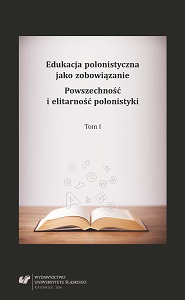
Keywords: holism; integration; educational paths; block education; multimedia thematic modules;
Holism, recognized by Jan Christian Smuts (1927) as a philosophical theory, turns out to be useful today in many fields of science dealing with subtly interlinked and interdependent elements. This theory is useful also in the Polish language teaching, which focuses on the functioning of literature and language in complex cultural and social systems. The holistic Polish language teaching associates texts of various media with the activity of students, their self-education, personal impressions and development of imagination. It refers to the internal and external integration and to various school subjects and educational paths. Block education, which is delivered in the form of multimedia thematic modules, assists with interpretation of paradigms concerning the functioning of language and literature. Such teaching units allow advance planning of teaching objectives, contents, tools and methods of teaching for the whole cycle of education. Therefore, such units eliminate the occasional and chaotic teaching. They provide optional choices of content and teaching methods, advocating the subjectivity of students and teachers. The modules trigger the effect of context by revealing the functions of means of expression, composition analogies and oppositions, and cultural influences. They provide time to disclose personal and local interpretations. These modules proved themselves in Australia. Thanks to comparative research tools, teaching of the mother tongue may take into consideration literary and linguistic phenomena related to the processes of social and cultural challenges.
More...
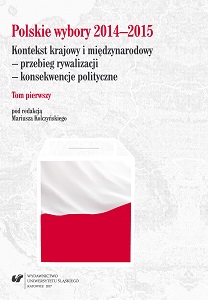
Keywords: woman; gender; elections; politics of equality
The aim of this study is to analyze 2014–2015 elections in Poland through the prism of women candidates. This study will address the following research questions: what role in these elections women have played and whether the observed phenomena contribute to the improvement of the overall situation of women in politics, or maybe just the opposite?
More...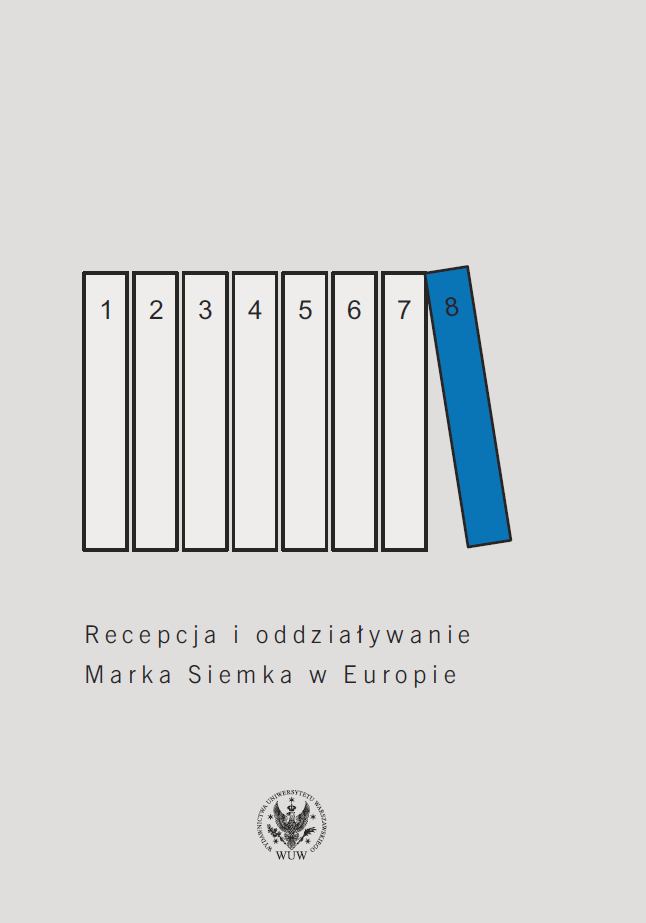
Keywords: Marx; Marxism; Engels; dialectic; reflection theory; Hegel
Marx’s position emerges in an ongoing dialogue with Hegel whom he never leaves behind. It is hence false to think that Marx’s overall position, specifically including Marxian economics, is, as is sometimes claimed, independent of his reading of Hegel. It is false as well that at a certain point in his intellectual trajectory, as Engels implies, and many Marxists, for instance Althusser, believe, Marx was finally able to free himself from philosophy in simply leaving Hegel behind. It is finally false to believe that Marx relies on what many Marxists call a reflection theory of knowledge. This view, which was adopted by Engels and Lenin, is a central element in Marxist theory of knowledge. Though this view is often attributed to Marx, it is never defended by him. This paper argues that, if our interest lies in understanding Marx’s position, since the reflection theory of knowledge has no basis at all in Marx’s writings, we should turn away from this Marxist myth.
More...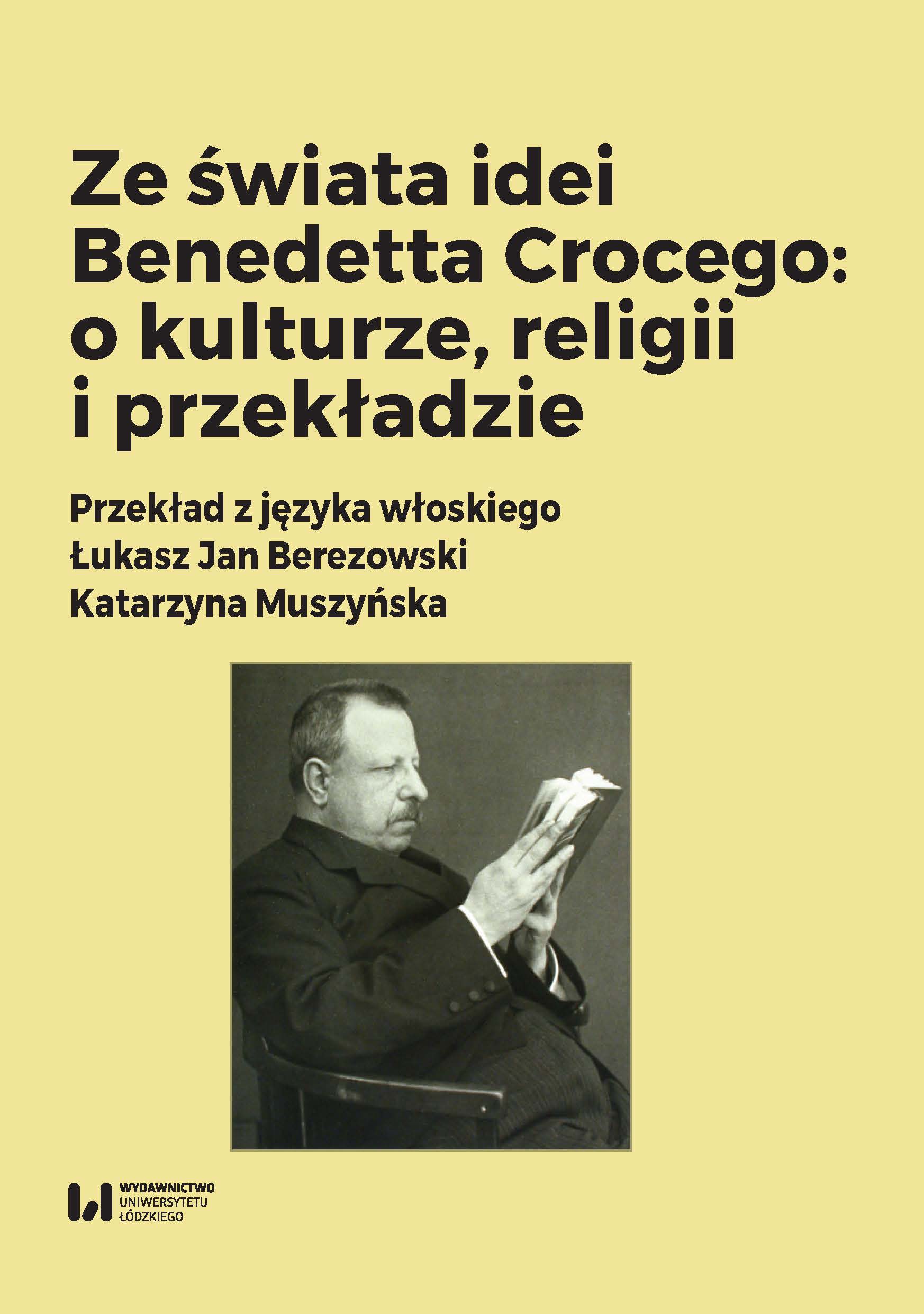
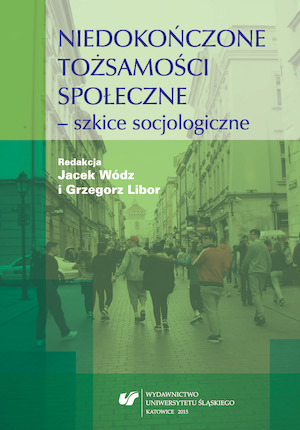
The article aims at acquiring answers to questions on how the Welsh identity can constitutean element of their own identity, which is separate from the English, Scotch, or Irish nationalidentities. Till this day what has made the Welsh different form other nations has beentheir language, as well as, though to a lesser extent, different customs, and also religion — apartfrom more and more conspicuous and negative to institutionalized and traditional forms, consequencesof secularization. As a result of the process of devolution of power that began in themid-1990s, institutions established at that time started to be seen as an element of such identity,for example, National Assembly for Wales and Welsh government. Any attempt to view humansexuality through the prism of national identity is thus considered as a certain novum in suchdiscussions. Apart from that, it seems that the thesis claimed in the paper is confirmed in thestatistical data.
More...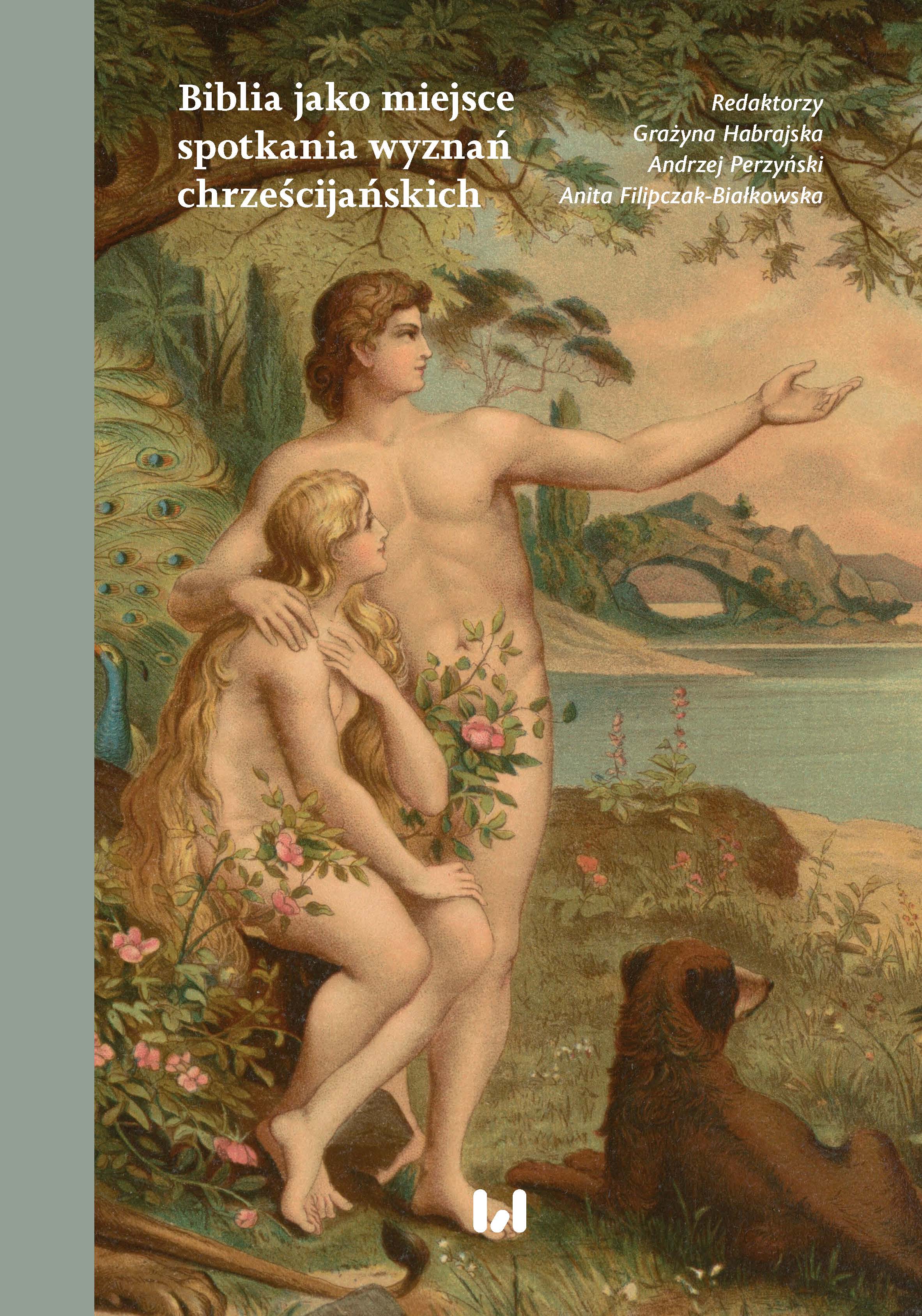
Keywords: “The Psalter”– translation by M. Rej; “The Psalter”– translation by J. Kochanowski; the supra-denominational character of Rej and Kochanowski’s translations; the art of translation
“The Psalter” has a special status among the books of the “Bible”. There have been numerous translations of this work into national languages. During the Renaissance, translations into Polish appeared. The subject of research in this article are the prosaic Rej’s “Psalter” and the poetic by Kochanowski – a masterpiece of Renaissance religious poetry. The literary workshop of both translators was shown. They took into account the experiences of earlier translators, especially Erasmus of Rotterdam. Both Rej and Kochanowski tried not to ostentatiously manifest their religious beliefs. Their translations are of little help to Christians of different denominations. They took care of the over-denominational significance of their translations.
More...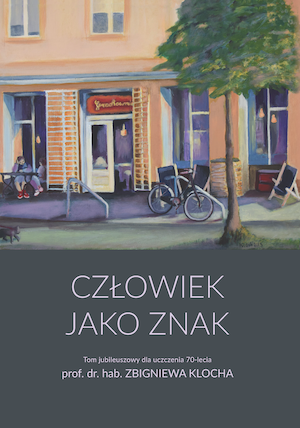
Keywords: animation; collage; documentary authority; philosophy of photography; photo transparency; space
The article focuses on the role of photography in the film “Another Day of Life” inspired by Ryszard Kapuściński’s prose of the same title. Photography was used to prepare artistic concepts and create the figure of main characters. Photography as an element of the film material was subject to activity similar to the collage method. As a semantic element, the act of photographing allowed to mark the moment of blurring the boundaries between text and image in the process of getting to know the world and blurring spatial relations. These ambiguous decisions were used by the authors to tell about Kapuściński’s birth as a writer.
More...